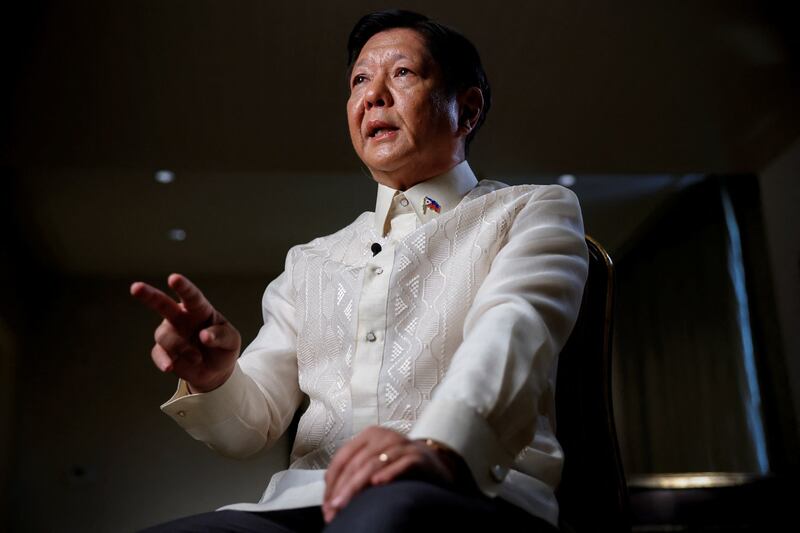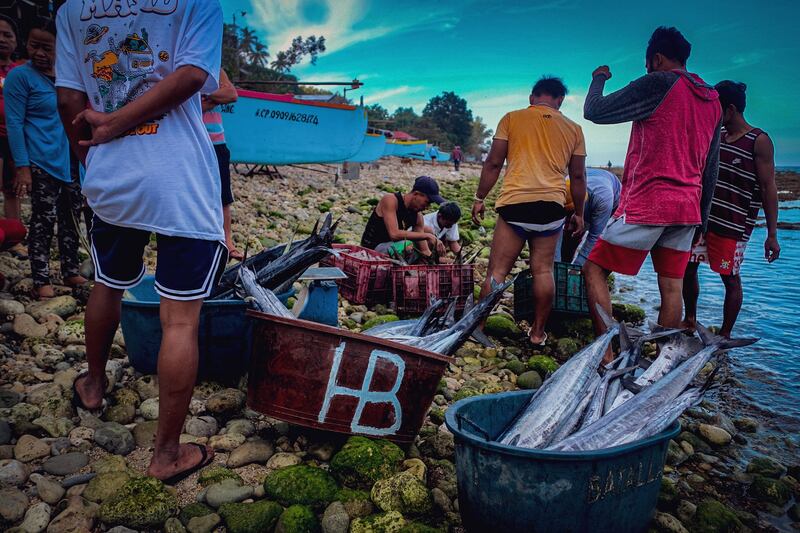A fishers’ group and others have slammed the Philippine president for saying he would coordinate with Beijing on its annual fishing ban in the disputed South China Sea, including in waters within Manila’s jurisdiction.
China has no standing to prohibit any activities in the Philippines’ exclusive economic zone (EEZ), critics said as they responded on Thursday to comments by President Ferdinand Marcos Jr. to reporters about planning ahead of the May-August Chinese ban to give fishermen an alternative source of income.
Beijing “has no right whatsoever to impose a fishing ban” in waters within the Philippines’ EEZ, said Antonio Carpio, a former Philippine Supreme Court justice and South China Sea expert.
That’s because in 2016, the Permanent Court of Arbitration in The Hague ruled in favor of the Philippines when it threw out China’s expansive claims in the waterway, he said. This was particularly true of the West Philippine Sea, the waters of the South China Sea within Manila’s EEZ.
China has been unilaterally imposing a fishing moratorium from May to August every year, claiming this promotes sustainable fishing.
But the Philippines has in past years protested against this, saying the practice violates its sovereignty. Some areas covered by the fishing ban are in Philippine waters.
“We cannot recognize China’s fishing ban in any part of our EEZ because that will … recognize China’s nine-dash line, which is the basis for China’s fishing ban,” Carpio told BenarNews, an RFA-affiliated news outlet, in a message on Thursday.
The nine-dash line is a boundary used by Beijing on its maps to demarcate its territorial claims in the sea.
“The Arbitral Award states that China’s nine-dash line cannot serve as a basis to claim waters or resources in the South China Sea,” Carpio said.

During his comments on Tuesday, Marcos made no reference to the validity of the ban or otherwise.
“When there is a fishing ban, we coordinate with them so we do not get surprised that there’s suddenly a fishing ban. So we can have some time to plan,” Marcos said, according to transcripts released Thursday.
“When they say there is going to be a fishing ban in two months’ time, then let’s plan: What will the fishers do? Let us give them another livelihood or another source of income.”
Marcos said he had raised the issue of Filipino fishers’ rights during his meeting with President Xi Jinping when he visited China in January.
“I really prioritized the issue of fisheries when we met. I said, let us not talk about the territory because we will not be able to decide now,” Marcos said.
“Let us prioritize the fisheries because these people are not at fault, why punish them? So we are making some progress in that regard.”
‘China has no moral ascendancy’
The activist fisherfolk group Pamalakaya is completely unconvinced by this argument of the Marcos administration, which it believes “should … reject Beijing’s annual unilateral ban.”
“There should be no room for any compromise, not even a coordination in regards to fishing activities in our territorial waters,” Pamalakaya said in a statement on Thursday.
“No amount of alternative source of income could equate the fishing livelihood of Filipinos in the resource-rich West Philippine Sea, and its significant contribution to our local food security.”
Additionally, Pamalakaya trashed Beijing’s claim about sustainable fishing.
“We remind President Marcos Jr. that China has no moral ascendancy, not especially a legal right, to impose a fishing ban on the pretext of marine conservation,” the group said.
“Because it is the one destroying our marine biodiversity and ecosystem through massive reclamation, illegal poaching, and industrial fishing expeditions.”

Marine scientists meanwhile have expressed alarm over the destruction of coral reefs in the South China Sea that are critical for the environment and preventing a collapse in fish stocks, which sustain the livelihoods of tens of millions of people.
Some of the South China Sea reefs are "gone forever" due to the creation of military bases atop them, John McManus, a professor of marine biology at the University of Miami in Florida, told Radio Free Asia in October 2020.
The majority of such construction has been by China, which dredged up Fiery Cross Reef, Subi Reef, Mischief Reef, Woody Island, and some other islets between 2014 and 2017, to make way for artificial islands that now host its military.
BenarNews is an RFA-affiliated news outlet.

